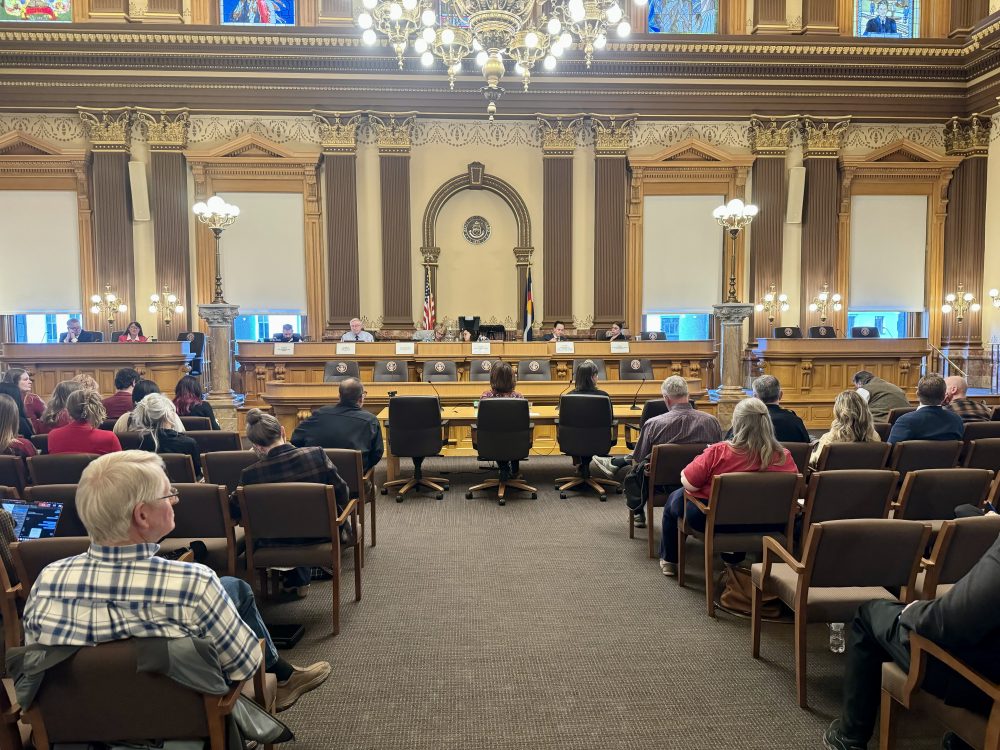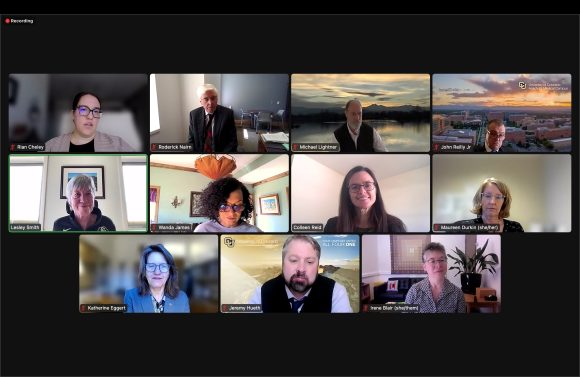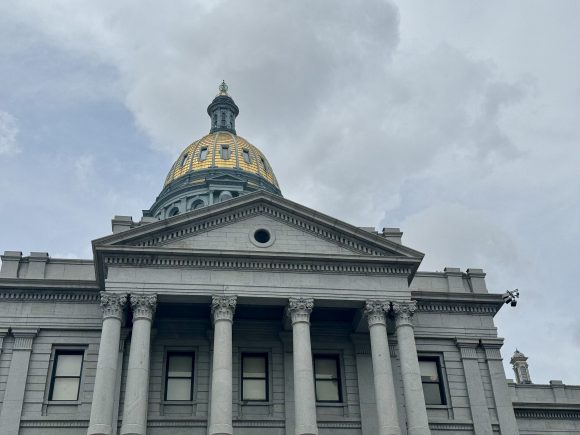
The Colorado Senate Judiciary Committee heard five hours of testimony on a bill that would ban firearms from a number of “sensitive places” on March 20, 2024. (Henry Larson/CU Independent)
Two government bodies in the state are considering initiatives that would ban the concealed carry of firearms on the University of Colorado’s campuses.
On Tuesday, March 19, CU Regent Wanda James announced she would make a motion to amend the university system’s policy that currently allows concealed carry. Any change to university policy would take place in the summer at the earliest.
The next day, the Colorado Senate Judiciary Committee held its first hearing on a bill that would ban carrying firearms in several public places – including all universities in the state. The measure was introduced in early February, and legislators will hold another hearing on the bill at a later date.
The efforts come after a recent shooting on the University of Colorado Colorado Springs’s campus that left two dead, including one student. Another UCCS student was arrested and charged with murder in connection to the shooting.

Members of the University of Colorado Board of Regents University Affairs Committee met virtually on March 19, 2024. (Kiara DeMare/CU Independent)
At the Board of Regents
During Tuesday’s Board of Regents University Affairs Committee meeting, Regent James said she planned to formally introduce a motion to ban concealed carry on all CU campuses at the body’s next full meeting on April 11.
A 2012 Colorado Supreme Court ruling required the university system to officially allow concealed carry on campus. However, a 2021 state bill gave the regents the ability to change that policy.
Some students across the university system have fought to restrict access to firearms on campus, while others have challenged these efforts at public meetings, ever since.
“If there is any place where we should be able to agree that we don’t need the presence of guns, it’s in higher [education] and definitely not in our hospitals,” James said in the committee meeting.
After James introduces the motion in April, it will be voted on and, if passed, sent back to committee for further review. The earliest vote to change the policy would be at the next board meeting in the summer, well after the end of the 2024 legislative session.
During the committee meeting, CU Vice President for Academic Affairs Michael Lightner said the policy change would not be necessary if the state bill was signed into law, but could stay in place if a court challenge put a future state law on hold.
A representative for Rocky Mountain Gun Owners (RMGO), a gun rights group in Colorado, said he wasn’t sure if the organization would sue the university system if the CU policy was changed.
In the state Senate
Senate Judiciary Committee members heard testimony on the bill to ban carrying firearms in some sensitive spaces on Wednesday. In the coming days, they will set another date to hear amendments to the bill and vote on sending it to the Senate floor.
Senate Bill 24-131 was introduced earlier in this year’s legislative session. It would ban carrying guns in government buildings, legislative assemblies, polling places, preschools, K-12 schools and universities.
Sen. Sonya Jaquez Lewis, a Longmont Democrat, is one of the bill’s sponsors.
“The policy is about setting up the right balance between preserving people’s ability to carry guns in public and setting aside places where they should not carry guns,” Jaquez Lewis told the CU Independent.
Early in the hearing, the sponsors said they planned to introduce amendments to cut down the number of sensitive places initially named in the bill – like bars, parks and banks. Those other places were the most controversial among members of the public who showed up to testify.
“We’re [amending the bill] because it gives us a bit more firm legal standing,” Jaquez Lewis said. “Since we have lawyers on the committee that are very interested in having that, we are working with them to make that happen.”
The bill was written in response to New York State Rifle & Pistol Association v. Bruen, a 2021 U.S. Supreme Court ruling that barred states from having certain restrictions on obtaining concealed carry licenses.
However, Justice Clarence Thomas’s opinion in Bruen expanded the court’s definition of “sensitive places” where guns can be banned, which has existed in some form since 2008. That list now includes locations like polling places, government buildings and schools.
Jaquez Lewis said this bill was designed to match the broader definition of a “sensitive place” the Supreme Court laid out in Bruen and earlier rulings.
If the bill makes it through its next committee meeting, likely with many of the original sensitive places removed, it will appear on the Senate floor for a full vote.

A view of the Colorado Capitol on March 13, 2024. (Henry Larson/CU Independent)
Even if the bill passes, it’s likely to face challenges in court. RMGO, the pro-gun organization, said it planned to sue the state if the original bill is signed into law as written.
However, RMGO Director of Operations Ian Escalante also said he wasn’t sure if the organization would sue if the amended bill – with a shorter list of sensitive spaces – was made law.
Still, the outcome of any challenge to a sensitive places bill is far from certain.
“I think there is some uncertainty now after the Bruen decision about these laws,” said Andrew Willinger, the executive director of the Duke Center for Firearms Law.
According to Willinger, states like New York, Maryland and New Jersey have all ratified similar laws. In New York, the 2nd Circuit Court of Appeals largely upheld its version of the law after a legal challenge. Another lawsuit surrounding a similar bill in California was struck down in federal district court but is awaiting oral arguments in the 9th Circuit.
“These laws have just been challenged across the board in pretty much every, as far as I’m aware, every state in which they have been enacted. Sometimes that’s even a pre-enforcement challenge,” Willinger said.
Willinger also said the Bruen ruling has made writing firearms bills more difficult because lawmakers and judges must now look for examples of similar laws in the country’s history in order to justify new legislation.
Public testimony
At the hearing, more than 160 community members signed up to testify and dozens spoke during the five hour period allotted for comment. At the end, there were “well over 50” people who had not spoken, according to Senate Judiciary Committee Chair Sen. Julie Gonzalez.
All three Boulder County commissioners testified in support of the bill, as well as the Boulder and Denver district attorneys, gun control advocates and dozens of University of Colorado students.
“It is a myth that an armed individual will stop a shooting any better than an unarmed individual,” Lindsay Nichols, the policy director for the Giffords Law Center to Prevent Gun Violence, said during the hearing.
Among the speakers were members of UCCS’s newly formed Students Demand Action club, a chapter of a much larger national gun control organization.
Students founded the group after the campus shooting on Feb. 16. They want concealed carry, on campus and inside UCCS’s student apartments, banned. A petition circulated by the group has garnered almost 700 signatures.
“It’s going to be a very long road before [the bill] is written into law and, quite honestly, we’re not waiting for that,” said Hayley Crist, a junior social work major at UCCS and co-founder of the Students Demand Action chapter, in an interview. “We’re angry, we’re fed up and we’re not wanting change, but we’re demanding it.”
According to UCCS officials, the university received just three requests for concealed carry in campus apartments. There is no data available on how many people concealed carry on any CU campus generally.
“As university students, our life’s work … has been cruelly interrupted,” UCCS Senior Laura Stephens testified. Stephens said she was motivated to speak because she knew Samuel Knopp, the UCCS student killed on Feb. 16.
Several gun rights advocates, representatives from rural police and sheriff’s departments and the vice chair of the Colorado Republican Party were among those who testified against the bill.
“Criminals will not be affected or stopped by this bill,” Kevin Tedesco, a Teller County Sheriff’s Office commander, said during the hearing.
Erika Woodyard is a family physician who runs a private practice in Mesa County. During the hearing, she said the lack of immediate access to law enforcement in her community made it important for her to have a concealed carry firearm.
“We are our own first responders. I cannot be disarmed,” Woodyard said during her testimony.
Some UCCS students were not in favor of the bill. Ben Kopriva, a senior mechanical engineering major, said he was also motivated to testify after the recent campus shooting.
“Removing the ability for me to defend myself is not only unconstitutional but also is immoral and evil,” Kopriva said in an interview.
The bill was laid over for a subsequent hearing at a later date, according to Sen. Gonzalez, and the committee will take up its proposed amendments then. The date of that hearing is not yet determined, although it could be as soon as next week.
Contact CU Independent Special Investigations Editor Henry Larson at henry.larson@colorado.edu.
Contact CU Independent Managing Editor Kiara DeMare at kiara.demare@colorado.edu.
